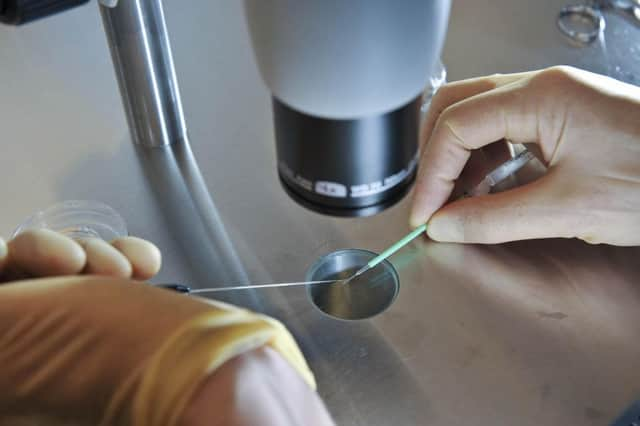Leaders: Properly regulated, this research can be of benefit


It is now more than half a century since the Cambridge University-based biological pioneers James Watson and Francis Crick produced their model of DNA structure. And ever since, the world of medical research has faced ongoing warnings about designer humans and genetically engineered babies.
So the news that a team led by Dr Kathy Niakan, at the London institute named after said Crick, will genetically modify human embryos has, perhaps unsurprisingly, prompted fresh concerns of the encroachment of science into the natural process of human reproduction. The concerns are certainly understandable. Last year, scientists in China carried out gene editing in embryos to correct a problem with blood disorders. On that occasion no explicit approval was given by regulators.
Advertisement
Hide AdAdvertisement
Hide AdIn Britain the situation is different. The researchers will only alter the genes of donated embryos which will then be destroyed after just a few days, after gaining approval from the Human Fertilisation and Embryology Authority. As well as public concerns, the issue has instigated widespread soul searching among the scientific community. After the Chinese revelations, a summit was staged in Washington towards the end of last year. While the leading biologists wanted to see embryo research continue in order to improve understanding of human biology, they drew a line at the creation of genetically modified babies.
But as scientific knowledge advances, it seems impractical to hold back the tide of change. Its not as if DNA altering techniques are not already being utilised, with the CRISPR-Cas9 tool, effectively a cut and paste system, helping speed up research for patients with blood immune or muscle disorders. It offers hope faulty cells could be removed, fixed in the lab, and re-implanted.
And for families where conditions like Huntingdon’s are prevalent, gene editing offers real hope for a new dawn. Those affected have a 50:50 chance of passing on this terminal condition to their children, but the techniques being pioneered mean that the fault could be corrected in the embryo, offering hope for generations to come.
The research being carried out by Dr Niakan is focussing on enhancing the understanding of IVF treatment and why it has such a low success rate. This is a huge issue for couples desperate to start a family and nowhere more than in Scotland, where waits have historically been lengthy and a postcode lottery. The Scottish Government has moved to tackle this in recent years. More than £12 million has been spent specifically to reduce IVF waiting times. But the fears over designer babies being expressed with the current research were also voiced when IVF first came on the scene a generation back. Mankind has been immeasurably improved over centuries by advances in medical research. Provided strict regulation remains in place on the activity in this case, there should be no fears over further research being carried out which has the potential for such huge advantages.
Penny for your thoughts, Keiza
The issue of taxation looks poised to play a dominant role in the forthcoming Scottish Parliament election campaign after Labour leader Kezia Dugdale followed the Liberal Democrats by pledging to raise income tax by a penny.
It is a move clearly designed to outflank the SNP on the left of Scottish politics from two parties who are floundering in the polls and desperate to come up with something that will kick-start their ailing campaigns.
Labour leader Kezia Dugdale hopes today’s announcement, to be set out during a keynote speech in Edinburgh, will provide some welcome respite to polling evidence which suggests that the party could be in line to lose all of its constituency seats in Scotland and – whisper it – end up behind the Conservatives as the main party of opposition.
There’s no doubt that the SNP has seized the traditional working class vote – effectively the middle ground of Scottish politics in recent years. It is understandable that Ms Dugdale seeks to turn over every stone to win voters back. But one wonders whether this announcement does not lack some ambition. This is the party of Keir Hardie and Scotland’s great socialist tradition. If it is serious about winning back the working masses and convincing ordinary Scots, Ms Dugdale will surely have to come up with more than a mere 1p tax rise – even if she is also clobbering high earners with a new 50p top rate.
Advertisement
Hide AdAdvertisement
Hide AdThere are now just three months until Scots come to choose their government for the next five years. Unless Labour is able to come up with a more rounded policy approach to win back its traditional Scottish heartlands, there appears little sign of an end to its slide into electoral obscurity.